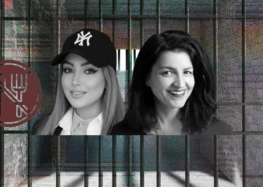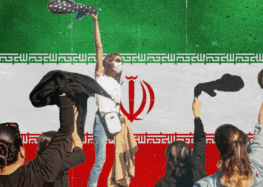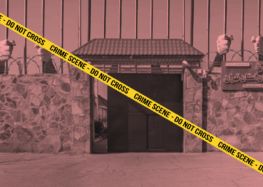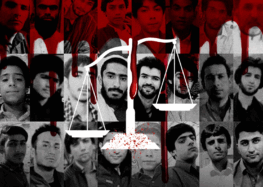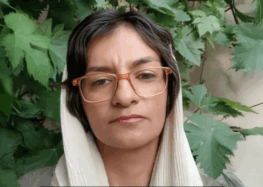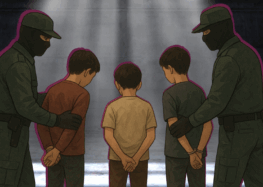Iran’s Rappers: Voices of Dissent, Targets of the State

Artists Face Arrests, Torture, Forced Confessions, Prison
October 27, 2025 — In Iran, rap music has become a powerful and peaceful form of dissent, with many rappers using their lyrics to express social and political grievances and criticize the government. As their music increasingly resonates with the country’s youth, rappers have become frequent targets of the Islamic Republic’s repression.
In the latest state crackdown on these artists, five rappers and a composer were arrested in recent weeks and forced into making on-camera “confessions” and “apologies,” with videos showing some of the men with shaved heads and partially unclothed to display their tattoos—an apparent attempt by officials to stigmatize and dehumanize them.
“The Islamic Republic’s brutal persecution of rappers—and dissident artistic voices more generally—demonstrates the regime’s deep fear of its own citizens and its unrestrained use of arbitrary arrest and torture to silence them,” said Esfandiar Aban, senior researcher at the Center for Human Rights in Iran (CHRI).
While the reasons for the arrests of the rappers and the specific charges against them remain unclear, several have a history of politically charged music and previous confrontations with the authorities. All, however, were subjected to forced confessions and public humiliation before any judicial proceedings, in flagrant violation of their fundamental due process rights.
CHRI calls on artists worldwide, as well as international organizations dedicated to the protection of freedom of expression in all its forms, to speak out in solidarity with Iran’s persecuted rappers and artists. They should condemn Iran’s assault on artistic freedom and demand that the Iranian authorities:
- Immediately release all rappers and artists detained for expressing dissent;
- Uphold the absolute prohibition against torture and the use of forced confessions;
- Uphold the right to freedom of expression, including dissenting artistic voices.
Further, CHRI urges the United Nations Human Rights Council, the UN Special Rapporteur on human rights in Iran, the UN Special Rapporteur on freedom of expression, and UNESCO’s Section for Artistic Freedom to launch an investigation into the persecution of Iranian rappers and other artists, and to issue an urgent appeal to halt all acts of torture, arbitrary detention, and forced confessions.
In a conversation with CHRI on the situation of the rappers in Iran, Saeid Dehghan, a prominent Iranian human rights lawyer and director of the Parsi Law Collective, said:
“Artistic freedom is not a privilege but a right, and an inseparable part of human dignity. While Iran’s civil society refuses to silence its poets and artists, because to do so would be to silence truth itself, the regime, fully aware of this power, relentlessly seeks to extinguish it. The regime’s violent response to artists stems from its awareness that musicians and poets play a crucial role in shaping Iran’s collective memory, transforming pain into cultural expression, and that their voices carry a universal and deeply human resonance.”
Home Raided, Equipment Confiscated, Arrested and Beaten in Detention
On October 9, 2025, Abbas Daghagheleh, a 22-year-old Arab rapper from Khuzestan known as “Rashash,” was arrested after security forces raided his home in Tehran and confiscated his mobile phone and music recording equipment. His Instagram page was also taken over by Iran’s Cyber Police. Daghaqaleh was released on bail on October 16, 2025.
A source close to Daghagheleh’s family told CHRI:
“During his detention, Rashash was severely beaten, and the signs of his injuries are clearly visible on his body.”
According to this source, security forces required him, as a condition of his release, to pledge not to publish any critical works or address topics deemed “against the Islamic Republic” or capable of “inciting public opinion.”
Another informed source told CHRI that his arrest followed his Instagram posts condemning the execution of six Arab political prisoners. Daghaqaleh uses his songs to address the economic, social, cultural, and political persecution faced by the Arab ethnic minority population in Iran’s Khuzestan Province.
In one of his songs named “Poverty,” he sings in Ahwazi Arabic:
“My patience has run out!
Why do we live in poverty while our land is full of wealth?
Why do they end the lives of those who speak of their rights?
Why must we study in a language that is not our own?
In another song, he says:
“Our people are deeply angry with you.
So many young people you have arrested.
This song of mine is pure reality.
Even in our dreams, we have never felt safe or at peace.
Our nation is full of pain and suffering…”
Daghagheleh’s music, which speaks to the systemic discrimination and poverty endured by Iran’s Arab community, also mirrors his own life story. Growing up in extreme poverty, he was forced to leave school in his teens to earn a living. He later moved to Tehran, where he worked on construction sites in search of better wages.
After his release on bail, Daghagheleh wrote on his Instagram story:
“They tried to force me to sign my silence, to promise I would never sing about pain or speak of our suffering. But I will write about all those who were not even allowed to scream.”
Forced “Confessions” Posted Online
On October 9, 2025, two rappers, Danial Faraji and Amir Ardalan Aghashahi—known by their stage names “Meshki” and “Dalu”—were arrested in Tehran by security forces. Their current status is unknown. State media accused the two of “producing and distributing unconventional and controversial works” and published videos of their forced confessions, which were also shared on the artists’ personal social media pages.
Faraji, also known as “Meshki,” who had never shown his face and is known for wearing a black mask in his music videos, was forced to remove his mask and express remorse in a video, saying:
“I deeply regret all my social and political activities on social media and in the rap scene, as well as any insult toward the Supreme Leader. I apologize to all judicial authorities. All of these actions were influenced by foreign media and the pressure of social media. I advise all my peers and my generation never to make the same mistake.”
Faraji, whose Instagram page has since been taken over by authorities, first gained recognition after his song “Hashashin” (Assassins) was released in January 2023 during the “Woman, Life, Freedom” mass protests across the country.
Are you protesting? Your answer is a burst of bullets
This is Iran — a terrifying place.
In the name of decrees, the executioner beheads.
Unaware of God, in the name of Allah.
The plundering, child-killing regime
They sing “May God forgive” with sealed lips
The leader has ordered them: “Attack”
They point pistols at innocent people
But it’s useless now, old man
They are against you, even the religious teachers
You thieves — you’ve taken Iran’s gold
You shipped it to Russia, Lebanon, and Libya
The Persian Gulf has become the Chinese Gulf
You can hear the slogans
“Death to the dictator of the present age”
We march in front of the machine guns
Love runs in our veins, faith in our hearts
During the Iran-Israel 12-day war, Faraji released a song on June 21, 2025, called “I am an Iranian,” in which he sings against war.
It’s not about the government;
It’s about Western invasion of our country’s territory.
It’s about civilians, about the killing of children.
From Aban (Bloody November state massacre) to Gaza,
Blood has splattered across walls.
It’s about people who can’t afford to migrate,
To escape when there’s war; to not lose their lives.
It’s about innocent people across all countries
The result of war is not freedom, but destruction.
In a separate forced confession video, Aghashahi, also known as “Dalu,” whose Instagram page has also been taken over by authorities, expressed regret for “displaying cold weapons” (i.e., weapons that are not firearms) and “using profanity in his music videos.”
Public Humiliation and Discrediting Part of State Strategy
On October 3, 2025, rappers Arash Sayyadi, Ashkan Shekaryan-Moghadam, and composer Rasam Sohrabi were arrested by Tehran’s Security Police under the pretext of “physical altercation and verbal abuse in a public space.” Their current status is unknown.
Videos of their forced “confessions” were posted by the Security Police on the artists’ own social media accounts. In the footage, the three men appear with shaved heads and shirtless, apparently to expose their tattoos, as they are made to “confess” to “taunting others online” and “disturbing public order,” and to express “gratitude” and “apologies” to the authorities.
The videos of their forced confessions prompted a strong reaction from Toomaj Salehi, a well-known dissident rapper imprisoned and previously sentenced to death for his protest songs. Salehi posted a video saying:
“It doesn’t matter who these three are or what they’ve done. The real question is: who gave these officers the right to terrify someone, shave their head, sit them in front of a camera, and force them to read from a script?”
Intensified Crackdown Against Rappers Since Woman, Life, Freedom Protests
In recent years, especially since the 2022 Woman, Life, Freedom mass protests, the Islamic Republic has intensified its crackdown on rappers through arbitrary arrests, violent detentions, and severe physical and psychological torture, often followed by draconian judicial sentences, including the death penalty.
Toomaj Salehi — The protest rapper Toomaj Salehi was arrested on October 30, 2022, after months in hiding during the nationwide Woman, Life, Freedom movement. He was violently beaten during arrest and subjected to extensive torture during detention, spending nearly a year in Dastgerd Prison in Isfahan. He was sentenced to six years and three months in prison in July 2023. Less than two weeks after his release in late November 2023, he was rearrested on December 9 in Babol following his revelations about the torture he endured in prison, and later sentenced to death in April 2024. The Supreme Court overturned this ruling in June 2024. Toomaj was also arbitrarily detained briefly during the June 2025 war.
Saman Yasin — Saman Sayyedi, known as Saman Yasin, a Kurdish rapper from Kermanshah residing in Tehran, was arrested on October 2, 2022, during the Woman, Life, Freedom uprising. He was initially held in Fashafouyeh Prison (Greater Tehran Central Penitentiary) and later transferred to Tehran’s Evin Prison. During early detention, he was denied family contact and subjected to extreme torture to force false confessions—including mock executions, solitary confinement, confinement in a “freezer room,” severe beatings, and other physical abuses. In December 2022, Branch 28 of the Tehran Revolutionary Court sentenced him to death, presided over by Judge Mohammadreza Amouzad. The Supreme Court overturned the sentence in January 2023 due to “procedural flaws” and remanded the case. On October 24, 2024, he was temporarily released on medical furlough after posting a four billion toman bail.
Vafa Ahmadpour and Danial Moghaddam — Two rappers, Vafa Ahmadpour (“Vafadar”) and Danial Moghaddam, were arrested in May 9, 2024, in Shiraz, Fars Province, and each sentenced by Branch 1 of the Shiraz Revolutionary Court in August, 2024 to one year in prison, a two-year travel ban, and a two-year ban on online activities for “propaganda against the regime.” Their prison terms will be served under electronic monitoring with restricted movement.
Sadegh Zilabi — On October 28, 2023, Sadegh Ghasemi Zilabi, a rapper from Izeh, Khuzestan Province, was arrested by security forces in Ahvaz, Khuzestan Province, and transferred to the local Intelligence Ministry detention center. He was released on bail on November 22, 2023.
Milad Jalili (“Ilishan”) — On November 28, 2023, Milad Jalili, known as Ilishan, was arrested by security forces in Tabriz, East Azerbaijan Province. On December 19, 2024, Branch 2 of the Tabriz Revolutionary Court acquitted him of “acting against national security by inciting unrest and violence” but sentenced him to eight months in prison for “propaganda against the Islamic Republic through performing political rap music in support of separatists.” The verdict was upheld in May 2024. On July 11, 2024, he was released from Tabriz Prison under electronic monitoring to serve the remainder of his sentence under movement restrictions.
“Silence on the part of the international community signals to the regime that they can go after these individuals with impunity, and that will only result in the brutal silencing of more dissenting artists,” said Aban.
This report was made possible by donations from readers like you. Help us continue our mission by making a tax-deductible donation.

